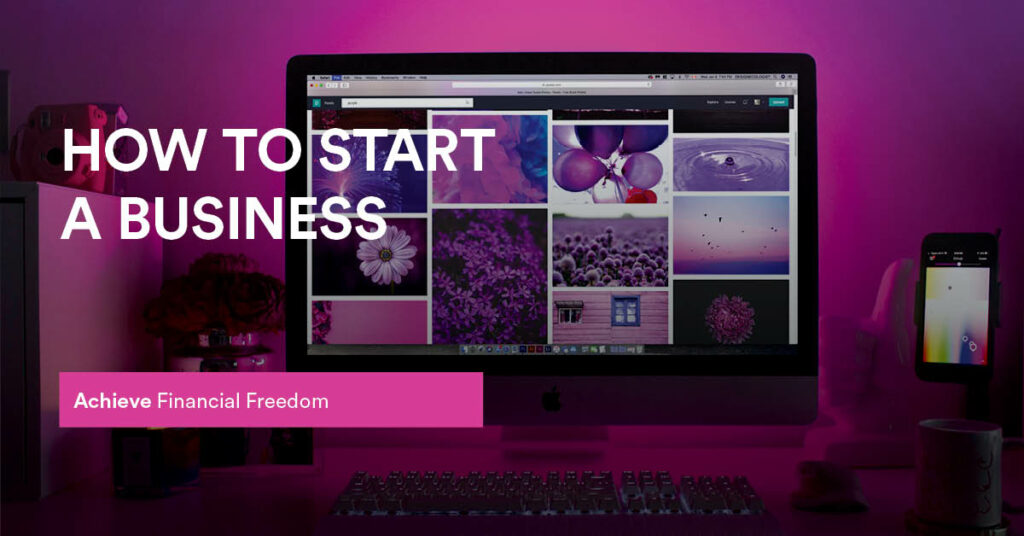Starting a business is one of the most rewarding ventures anyone can undertake. I firmly believe that anyone has the ability to start a business and use it to achieve their own version of financial freedom.
However, starting a business can be scary. Many people forgo this opportunity because they are unsure of the steps or processes they must take to start a profitable business.
In my past experience working with business owners and entrepreneurs across the UK and Ireland, I have helped launch and grow thousands of online and offline businesses. Many of these businesses started in the back bedroom and their owners worked on them in the evenings and weekends. A large number of these businesses have then replaced the owners’ working income and have become their full-time businesses.
In this article, I aim to break down the steps you need to take to start your own business. I’ll also give you a nod to the challenges you might face and some actionable tips on overcoming them. Let’s remove the mystery and fear behind starting a business and let you get to it.
After reading the article, if you want help starting your own business, you can check out my business coaching services. I offer a small number of sessions per month to aspiring business owners who want to plan out their businesses and take action.
Want to start a business? In this video, I aim to break down the steps you need to take to start your own business. I’ll also give you a nod to the challenges you might face and some actionable tips on overcoming them. Let’s remove the mystery and fear behind starting a business and let you get to it.
How to start a business – Video
What are the steps to starting your own business?
- Choosing the product or service to sell: Start by identifying what you are passionate about and what you are good at. Then, find a need in the market that you can fulfil with your skills and expertise. If you’re stuck, I have a list of business ideas that might give you a little inspiration.
- Deciding on your business name: Choose a name that is easy to remember, reflects your brand and resonates with your target audience. Get honest feedback from your family and friends. Once you decide on your business name, stick with it.
- Build your brand: Your brand is what people say about you when you’re not in the room. It’s not just your logo and should be an integral part of your business strategy. Targeting your ideal customer is more effective with a strong brand strategy.
- Figuring out where to sell your products or services: Will you sell online? Will it be on your website or another platform like eBay or Amazon? Do you need physical premises to provide your services? Think about the future of your business, not just the here and now. Planning for this when starting your business can save thousands of pounds later.
- Finding customers: Your business isn’t a business until you start making sales. Finding customers is critical to remaining in business, becoming profitable and being able to grow your business. Being sales focused in every aspect of your business is critical. Marketing isn’t just about sharing a few designs on social media. Taking sales and marketing seriously and making them a primary focus is key.
- Getting repeat business: Getting repeat business is the key to success. Keeping a customer is always easier than finding new ones. Providing excellent customer service as a standard shouldn’t be hard, but many companies fail to do so. Better than the rest.
- Growing your business: Continuously innovate, diversify your offerings, and explore new markets to expand your business. If you stay the same, either your customers will outgrow your services or your competitors will better your business. Keep moving forward and keep your competitors away from your door.
- Keeping your business profitable: Starting a business costs money. Running and growing a business, costs money. Stay on top of your finances, track your expenses and revenue, and adjust your strategies as needed to ensure your business stays profitable. Live in your accounts programme and know where every penny comes from and goes.
- Plan for taxes: Speak to your accountant and understand what your tax obligation may be. Running a business for the first time throws up some challenges and the least of these is managing the money you owe to the tax man. Make sure you allow for this and put any money you might owe into a separate account.
How much does it cost to start a business?
Starting a business can be as expensive or as frugal as you make it. Being successful in business is not about splashing the cash or the alternative of hoarding it. Rather, it’s about using your money wisely to grow the business in a profitable way.
Expenses involved in starting a business
There are some expenses you will undoubtedly need to consider when you start a business. The level at which you spend on each of these will depend on your business and what your ambitions are.
- Premises
- Stock
- Branding
- Website
- Marketing and sales materials
- Staffing
- Running costs
- Equipment
This list is not exhaustive and it’s true that there is often a high barrier to entry to many business ventures. But that shouldn’t put you off and with a bit of creative thinking, you can work very efficiently with very little income.
For example, I started my first business in 2009. It was a printing company and if you don’t know, commercial printing equipment is very expensive. It was simply beyond my reach to afford one.
What we did instead was partnered up with a highly establish printing company and bought “press time” each week. This meant we had the majority of cost savings on print, without the need for £ 1 million + printers and the staff to run these 24/7.
We batched all our orders together on the same paper weight and then had the commercial printer print these. We were able to get a wholesale rate on the printing, which allowed us to remain competitive in the market we operated in.
Eventually, when our business grew and we were able to afford the printers ourselves, we invested the money into this equipment. It helped us grow to become more profitable, to serve more customers and to do so in a faster and more efficient manner.
Budgeting and financial planning
When you start a business the most critical factor is to plan your finances and budget for these. While your business may not initially be profitable, it must become so promptly. Planning both for income and expenses is therefore a top priority.
Understand the value and the costs of your customers so you can plan for the best and worst-case scenarios.
Final thoughts
The steps to start a business can be daunting, but with the right mindset and tools, anyone can achieve success. When building a business, you will learn an unlimited number of new skills and grow considerably as a person. The other primary benefit is, of course, that you will earn more money.
Always give consideration to the goals that you want to achieve. Use these goals to shape your decisions. Every day, there is no point working 24 hours a day on your own business if you’re not making money and it’s not giving you the lifestyle you choose.
In conclusion, starting a business is challenging but it can be one of the most rewarding things you ever do. It requires hard work, dedication, and perseverance, but the rewards are worth it. Keep your goals in mind, stay focused, and don’t be afraid to ask for help when you need it.
Check out the Foundered Money YouTube Channel


